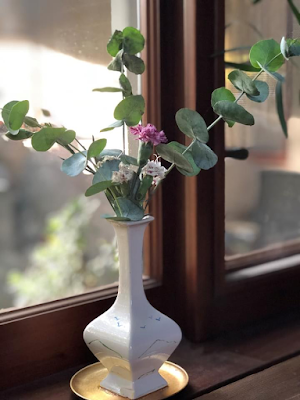

|
|
Simplicity is a key to Japanese flower arranging.
(Photo courtesy UC Davis Arboretum) |
With all the hurried days this time of year, it’s nice to have a chance to relax, even for just an hour, and learn a new, quiet skill.
At 12;10 p.m. Friday, Dec. 18, The UC Davis Arboretum and Public Garden is offering just such an opportunity.
A free class in Japanese flower arranging will be taught by UC Davis Professor Emeritus Haruko Sakakibara via Zoom. It’s offered via the Nature Rx program at UC Davis.
Students will create a small table arrangement from supplies easily found around the house. Even a mayonnaise jar, for example, can work ad a vase. Pebbles or marbles go in the bottom.
Smaller flowers cut from the garden or purchased at a store (such as a supermarket or Trader Joe’s) add the color. Greens from shrubs such as nandina or camellias fill out the arrangement.
Register here:
https://ucdavis.zoom.us/meeting/register/tJwqcuqspjMsEtTHb6p73o1IYJZHjKzc9kRV
Learn more about the supplies needed:
https://bit.ly/NatureRx-121820
The class also is sponsored by Each Aggie Matters, Healthy UC Davis, and UC Davis Staff and Faculty Health and Well-being.
— Kathy Morrison
Comments
0 comments have been posted.Sacramento Digs Gardening to your inbox.
Food in My Back Yard Series
April 1: Don't be fooled by these garden myths
March 25: Fertilizer tips: How to 'feed' your vegetables for healthy growth
March 18: Time to give vegetable seedlings some more space
March 11: Ways to win the fight against weeds
March 4: Potatoes from the garden
Feb. 25: Plant a fruit tree now -- for later
Feb. 18: How to squeeze more food into less space
Feb. 11: When to plant? Consider staggering your transplants
Feb. 4: Starting in seed starting
Sites We Like
Garden Checklist for week of March 30
Your garden doesn’t mind April showers. Get busy now to enjoy those future flowers.
* Get ready to swing into action in the vegetable garden. As nights warm up over 50 degrees, start setting out tomato, pepper and eggplant transplants.
* From seed, plant beans, beets, cantaloupes, carrots, corn, cucumbers, melons, pumpkins, radishes and squash. (Soak beet seeds overnight in water for better germination,)
* Plant onion sets.
* In the flower garden, plant seeds for asters, cosmos, celosia, marigolds, salvia, sunflowers and zinnias.
* Transplant petunias, zinnias, geraniums and other summer bloomers.
* Plant perennials and dahlia tubers for summer bloom.
* Transplant lettuce and cabbage seedlings.
* April is the last chance to plant citrus trees such as dwarf orange, lemon and kumquat. These trees also look good in landscaping and provide fresh fruit in winter.
* Smell orange blossoms? Feed citrus trees with a low dose of balanced fertilizer (such as 10-10-10) during bloom to help set fruit. Keep an eye out for ants.
* Apply slow-release fertilizer to the lawn.